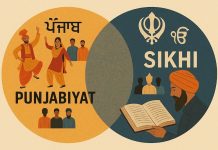
Winners of Guru Nanak Social Mobility Bar Scholarship 2021 (L-R): Anu Radha Lal, Michael Abiodun Olatokun and Haisheeny Kaur
By Asia Samachar | Britain |
Anu Radha Lal, who is studying the Bar Course at the Inns of Court College of Advocacy, has won the first prize of the Guru Nanak Social Mobility Bar Scholarship 2021.
She wins with £4,000 to alleviate the financial burden of pursuing a career at the Bar and also mentoring for one year.
Lal impressed with her strong commitment to the Bar despite facing a number of substantial obstacles. Her essay was well-researched; structured and engaging. She demonstrated a strong desire and ability to practise as a barrister, according to a statement announcing the results.
The scholarship, jointly organised by Mukhtiar Singh and the Sikh Education Council since 2018, aims to improve social mobility in professions perceived to be out of reach for those from poorer backgrounds. This will be achieved through financial awards, mentoring and work placements.
Mukhtiar is a barrister at a Garden Court Chambers and focuses his practice on tackling social injustice and inequalities in the workplace and beyond.
The second aim of the scholarship is to encourage a wider understanding of Sikh jurisprudence by considering whether society may learn from Sikhism for the benefit of us all.
The second place, with a prize money of £300, went to human rights lawyer Michael Abiodun Olatokun. Haisheeny Kaur who won the third place will be offered a work placement. She is also the vice president of the University of the West of England Sikh Society.
The applicants were asked to write an essay on, “Compare and contrast the rights to protest in England & Wales with such rights in India”. Lal’s article can be read here.
She argued that the coloniser mentalities common to both England & Wales and India resulted in under-policed right-wing movements and prejudice towards marginalised groups.
“The most significant difference between jurisdictions is the state policing of protests. Even though both jurisdictions view certain protesters as pests, India’s police response is far more life-threatening than England & Wales,” she wrote.
She also noted that protesting was nothing new to Sikh jurisprudence; noting that it was why the three moral directives to (1) treat all people as equal, (2) protect the oppressed and (3) fight against injustice can markedly improve the rights to protest for the citizen, association and State.
RELATED STORY:
One-time music jockey joins US law firm to expand Singapore corporate practice (Asia Samachar, 29 Nov 2021)
ASIA SAMACHAR is an online newspaper for Sikhs / Punjabis in Southeast Asia and beyond.Facebook | WhatsApp +6017-335-1399 | Email: editor@asiasamachar.com | Twitter | Instagram | Obituary announcements, click here
































